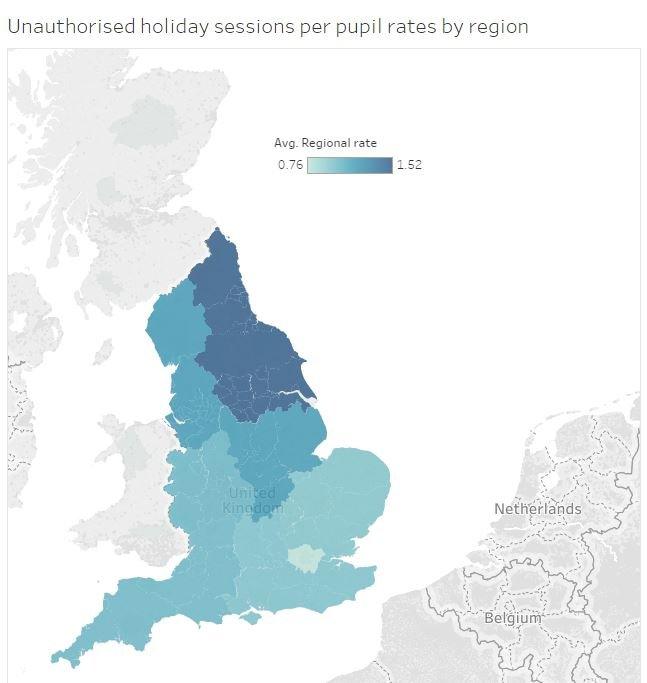Term-time holidays: Where most children were absent
- Published
- comments

The number of school days lost to term-time holidays is rising
Term-time holidays accounted for a quarter of unauthorised absences from schools in England, analysis of official figures shows.
Almost a million children missed at least one day of school in England, despite the threat of fines.
Teachers said the fines were a "blunt instrument" and the problem was down to the price of holidays.
The Department for Education said unauthorised absences damage children's life chances.
Torbay, Bournemouth, Poole, Cornwall and Devon are among the 10 areas with the highest percentage rise in holiday absence.
Across England, term-time holidays accounted for an average of 27% of all missed "sessions" of school. There are two sessions of school each day, morning and afternoon.
Pupils in Yorkshire and The Humber and the North East of England lost the most time to holiday. The figures showed the number of absences was equivalent to 1.5 school sessions for every pupil. In Outer London the figure was equivalent to 0.75 days per pupil.
In areas like Warrington and East Riding, family holidays made up almost half of all missed school sessions.
The figures cover 2015-2016. In May 2016 a father won a case at the High Court to overturn a £120 fine levied for taking his daughter to Florida during term time.
Isle of Wight Council appealed against the verdict and Jon Platt's case went to the Supreme Court in 2017, which ruled against him.
Rules came into force in 2013 following concerns that some families saw going away during term-time as an entitlement.
If a school declares an absence unauthorised, the council can fine a parent £60 per child, which doubles to £120 if not paid within 21 days.
However, the fines appear to have not proven a deterrent as the number of unauthorised holiday absences has continued to rise.
Russell Hobby, general secretary of school leaders' union NAHT, said: "It is important that children miss as little time at school as possible.
"The cumulative effect of missed days can be harmful to children's education. The best way to ensure children are learning and progressing is for them to attend school during term time.
"However, the system of fines is clearly too blunt an instrument and in many cases it drives a wedge between schools and families. The real problem is holiday pricing. Neither parents nor schools set the prices of holidays. They will both continue to be caught between a rock and hard place without some sensible government intervention."
Representatives of the tourism industry said it was not possible to say whether people in the industry were taking their children out of school so they could have a family holiday outside of the peak season, when they would need to be working.

Jon Platt took his daughter out of school for a trip to Florida
Paul Kelly, chief executive of the British Association of Leisure Parks, Piers and Attractions, said: "Our position, regardless of what these figures say, is that consideration does need to be given to people that work in the tourism industry.
"We don't support taking children out of school during term time but consideration does need to be given to people working in tourism based on factors such as their children's overall attendance and attainment."
Altogether, there were 2.6m children with at least one unauthorised absence, compared with 2.4m in 2014-15. This figures include pupils who arrived late for school.
The Department for Education insisted overall absence remained at "historic lows" and that persistent absence had fallen by more than a third since 2010-11.
A spokeswoman said: "The rules are clear - children should not be taken out of school without good reason. Evidence shows that every extra day of school missed can affect a pupil's chances of achieving good GCSEs, which has a lasting effect on their life chances.
"That is why we have tightened the rules to put teachers firmly back in charge of their classrooms, and we are supporting schools and local authorities to use their powers to tackle unauthorised absence."
For an interactive version of this map, click here, external

- Published29 January 2017
- Published31 January 2017
